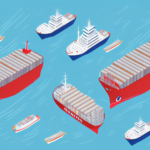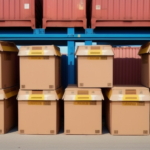In today's fast-paced world, courier services have become an integral part of our daily lives. From delivering important documents to shipping large cargo items, courier services have made our lives easier and more convenient. But with so many options available, determining the cost of courier services can be challenging. This comprehensive guide explores the various factors that affect courier service costs and provides tips on choosing the right courier service for your needs while minimizing expenses.
Understanding Courier Services
Types of Courier Services
Before selecting a courier service, it's essential to understand the different types available:
- Domestic Courier Services: Handle shipments within the same country.
- International Courier Services: Manage shipments overseas, adhering to international regulations.
- Same-Day Courier Services: Reserved for urgent deliveries that need to arrive on the same day.
- Eco-Friendly Courier Services: Utilize environmentally friendly vehicles and delivery methods to reduce carbon footprints.
Choosing the right type depends on your specific shipping needs, whether it's speed, destination, or environmental concerns.
Factors Affecting Courier Service Costs
Several factors influence the cost of courier services:
- Type of Shipment: Documents, packages, or large cargo items have different pricing structures.
- Distance: Longer distances generally incur higher costs.
- Urgency: Faster delivery options like same-day or next-day delivery come at a premium.
- Package Size and Weight: Heavier and larger packages cost more to ship.
- Mode of Transportation: Air transportation is faster but more expensive than ground transportation.
- Additional Services: Insurance, fuel surcharges, and customs duties can add to the total cost.
Understanding these factors can help you estimate and manage your courier expenses effectively.
Selecting the Right Courier Service
Choosing Based on Your Needs
When selecting a courier service, consider the following:
- Delivery Speed: Determine if you need same-day, next-day, or standard delivery based on urgency.
- Delivery Coverage: Ensure the courier service covers your required pickup and delivery locations.
- Package Handling: Some services specialize in fragile or oversized items.
- Security Measures: Look for services that offer GPS tracking, signature confirmation, and insurance coverage.
Common Mistakes to Avoid
Avoid these common pitfalls when choosing a courier service:
- Ignoring Reviews: Always check customer reviews and ratings to gauge reliability.
- Focusing Solely on Price: The cheapest option may not always offer the best service quality.
- Overlooking Hidden Fees: Be aware of additional charges like fuel surcharges and insurance fees.
- Poor Customer Service: Choose a courier with responsive and helpful customer support.
Cost Management Strategies
Negotiating Better Rates
To negotiate better rates with your courier service provider:
- Compare Rates: Research and compare prices from multiple courier companies.
- Leverage Volume: Providers may offer discounts for bulk shipments or regular business.
- Understand Service Levels: Opt for standard delivery if time is not a constraint to reduce costs.
Effective negotiation can lead to significant savings, especially for businesses with high shipping volumes.
Tips for Saving Money
Save on courier costs without compromising quality by:
- Consolidating Shipments: Combine multiple packages into a single shipment to reduce costs.
- Optimizing Packaging: Efficient packing can minimize size and weight, lowering shipping fees.
- Utilizing Discounts: Take advantage of discounts offered for bulk orders or long-term contracts.
- Choosing Slower Delivery Options: If time permits, opting for standard delivery can be more economical.
Shipment Management
Tracking Your Shipments
Tracking shipments is crucial for ensuring timely delivery. Most professional courier services provide real-time tracking information, allowing you to monitor your package's progress. This feature helps anticipate delays and address issues proactively.
According to a National Corporation report, real-time tracking increases customer satisfaction by 30%.
Handling Lost or Damaged Packages
If your shipment is lost or damaged:
- Contact the Courier: Notify the service provider immediately and file a claim.
- Document Damage: Take photographs of the damaged package and its contents.
- Understand Policies: Review the courier’s terms and conditions regarding claims and liabilities.
Prompt action can expedite the resolution process and secure compensation.
Insurance Coverage
Insurance is vital when shipping valuable or fragile items. Professional courier services offer various insurance options to protect your packages against loss or damage. The cost of insurance typically depends on the declared value of the shipment.
Investing in insurance provides peace of mind and financial protection, especially for high-value items.
International Shipping
Understanding Regulations
International shipping involves navigating complex customs regulations and import/export laws. Each country has its own set of rules governing the shipment of goods, which can impact delivery times and costs.
Resources like the U.S. Customs and Border Protection provide comprehensive guidelines for international shipping.
Managing Customs and Duties
When shipping internationally, consider the following:
- Customs Documentation: Ensure all necessary documents, such as invoices and declarations, are accurately completed.
- Taxes and Duties: Be aware of applicable taxes and import duties, which vary by destination country.
- Engage a Customs Broker: A customs broker can facilitate the clearance process and handle complex regulations.
Proper management of customs and duties is essential to prevent delays and additional costs.
Packaging Best Practices
Packing Your Shipment
Proper packing is crucial to protect your items during transit. Consider the following best practices:
- Use Quality Materials: Choose sturdy boxes and cushioning materials to prevent damage.
- Seal Securely: Ensure all packages are tightly sealed to avoid openings during transit.
- Label Clearly: Clearly label packages with accurate delivery addresses and contact information.
Labeling Your Shipment
Accurate labeling helps in the efficient handling and delivery of your package. Include the following details:
- Recipient’s Address: Ensure it's complete and legible.
- Sender’s Information: Provide accurate contact details.
- Tracking Number: Include the tracking number for easy monitoring.
Proper labeling reduces the risk of lost or misrouted packages.
Conclusion
Determining the cost of courier services involves understanding various factors such as shipment type, distance, urgency, and additional services. By selecting the right courier service, effectively managing costs, and adhering to best practices in packaging and shipping, you can ensure timely and secure delivery of your packages. Utilize the tips provided in this guide to make informed decisions and optimize your courier service experience.






















